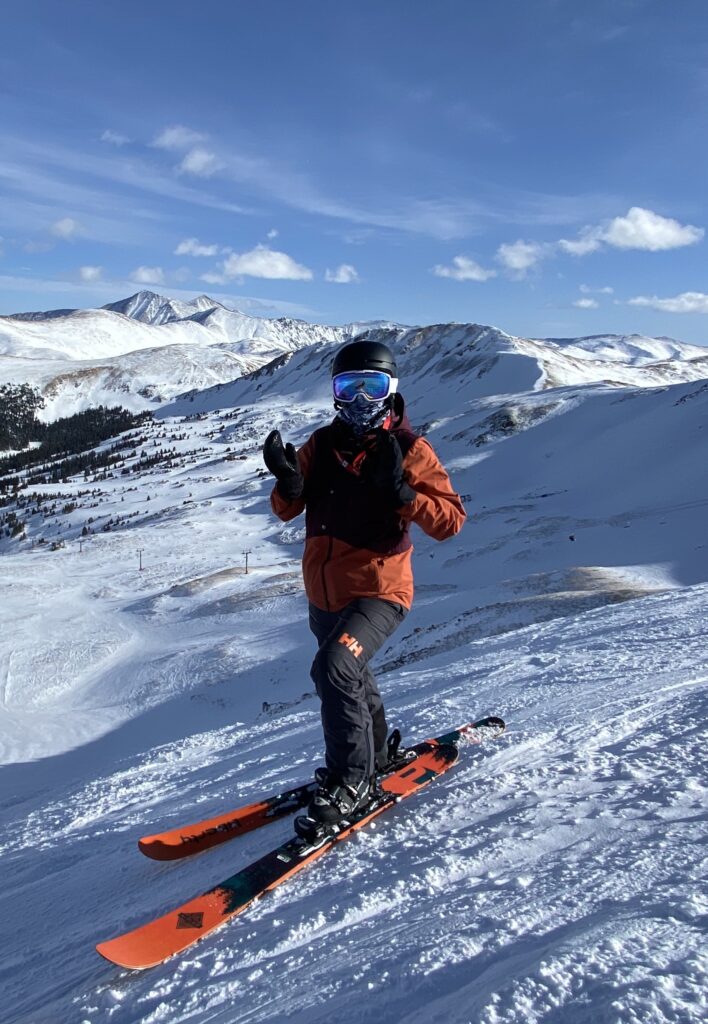Stonecoast Review
The Literary Journal of the Stonecoast MFA
Staff Spotlight
Dinah McCahan

Dinah McCahan lives in Colorado, and enjoys skiing and bouldering.
What do you write?
To be honest, I’m still figuring it out! I gravitate towards genre fiction, but I’m always excited to try out different forms.
Is there an author or artist who has most profoundly influenced your work?
Like many, I found writing through my love of reading. One of the first books I can remember reading as a kid is Madeleine L’Engle’s A Wrinkle in Time. It definitely fueled my imagination, and to this day, Camazotz still terrifies me!
Why did you choose Stonecoast for your MFA?
I was looking for a place where I could write genre fiction, without it being looked down upon.
What is your favorite Stonecoast memory?
A sock exchange with my cohort during our second residency! I got Nancy Drew themed socks that are some of my favorites in the sock drawer.
What do you hope to accomplish in the future?
My next big goal is to finally write that novel!
If you could have written one book, story, or poem that already exists, which would you choose?
Mikhail Bulgakov’s The Master and Margarita. I love its story-within-a-story combination of satire and the supernatural. It’s beautifully weird and darkly funny, qualities that I wish I had in my own writing.
The following is a previously unpublished story by Dinah.
Families eat their own stories. They are circulated, ad nauseum, told and retold until no one knows to whom they truly belong.
This story is my mother’s. Or it was. She is dead now.
I was a child when I heard it. I would curl next to her, burying myself into her sides when frightened.
Or rather, it was a sanitized version I heard. Later, when I was older, I heard the truth. So, I suppose, now the story is mine.
#
It takes place when my mother herself was a child, in the 70s. My mother and her friend Sue had a choice: they could play Barbies, roller skates, jump rope, or the woods. On this particular day, they chose the woods. They rode their bikes down from their suburban homes to the edge of the creek that bordered two neighborhoods. In my mind, they are like the children from Stranger Things, with their oddly wide-set bike handles and their tendency to roam.
Although that is not quite right, since the girls must have been barefoot. That is how my mother lost a toe, several years later—it caught in a bicycle chain. She liked to frighten my friends with the sight of the severed appendage. She would kick off her shoes and wiggle them, and all the little children would shriek and run away, and then creep back for a second look.
Sue and my mother threw down their bikes and made their expedition through the undergrowth, avoiding the minefield of sweetgum balls. It was summer, so everything was leafy and green, and dripping with humidity.
“Wait for me!” my mother shouted.
Sue had already reached the creek bank. Other children liked the creek too. Sometimes boys would occupy its shores, throwing mud at each other and then at the girls, if seen. My
mother and Sue hated them with a passion, invaders to the sacred place as they were. But this time the girls were alone.
My mother scrambled over a fallen log. As she dropped down, her foot brushed against something unfamiliar. She jerked away and stumbled backwards. Her first thought—copperhead!—was mercifully incorrect. She inched closer, but the hollow place underneath the log was dark and she couldn’t make anything out. She took a stick and poked at it. Nothing moved, but she knocked against something solid.
My mother, on hands and knees, crept closer and peered into the darkness. This time, she saw something.
The something she saw was bones. Large bones. Human bones.
My mother’s breath came quick. She had long expected to find bones, or treasure, or some mysterious fairy tome in these woods. Her day had come.
But, she must be only cautiously hopeful. One time before she had come across the skull of a dragon, only to find that it was, in fact, that of a dog.
“Where are you?” Sue shouted. My mother jumped.
“I’m over here! I think I found something, you better come see!”
She carefully fished out some of the bones with her stick. The skull rolled onto the leafy ground. Although covered in rotting plants and dirt, it was unmistakably human. “Oh my goodness ‚” Sue said. She was breathing hard. I picture her as a blonde, with watery eyes and a kind smile. Although, of course, she was would not have been smiling at the time.
My mother poked the skull with her stick. It rolled. Both girls shrieked. For the first time, my mother felt fear.
#
The girls waited in Sue’s basement. It was dark and humid. The carpet was covered in Barbie-scenes, the dolls posed with blow-up furniture.
I would later inherit these dolls. My friends and I shunned these dolls; they were for girly-girls, which we clearly were not. So they went mostly ignored in their cardboard-box home, occasionally brought out to serve as extras in other dolls’s adventures, or to be subjected to more deliberate torture. We once decapitated one with an Exact‑o knife after trying her for witchcraft. I had wanted to burn her at the stake, but my mother forbad it. The cardboard box is still tucked away in a distant corner of my closet. I can’t quite bring myself to get rid of it.
Sue absently picked up one Barbie, then set it down. My mother had her arms wrapped around Sue’s family dog. She buried her face in the dog’s warm fur.
At first, Sue’s mother had not believed their story of the bones. She had insisted on seeing them. When she did, she went very white, and went to call the police. The girls hid in the basement, and waited.
“What do you think happened?” Sue said.
My mother tugged at the dog’s fur. The kindly creature—a golden retriever, perhaps—submitted to it without protest.
“I don’t know,” she said. A thought occurred to her, a very clever one too. “Probably someone just left the bones there ‘cause they didn’t want to pay for a funeral. I saw on the news that coffins cost thousands and thousands of dollars.”
Sue was unconvinced. “I bet it was a little girl. Like us, but younger. And she was killed.” “Why?”
Sue shrugged. “I just know.”
#
Sue was right. My mother overheard her parents talking about it weeks later. They didn’t want to tell her anything, so she listened in at their door. The bones were a little girl’s, a little bit younger than my mother. She had gone missing a year before, from a different part of town. The police had never found any evidence before this in connection with her case.
“That’s awful,” my grandmother said.
“We should be careful with her, at least until the police … No going out after dark,” my grandfather said.
My mother was indignant. She liked to roller skate in the evenings, when the asphalt was cooler.
#
In my mother’s version, they never did find out what happened to the dead girl. My mother told me that she would periodically look to see if there was new information on the case. There never was.
#
In my version, it was Sue’s father. He killed the girl, and other little girls, too. When the police came to take him away, Sue and my mother were jump-roping in the front of their house. They watched as the police took Sue’s father, hands cuffed and shoulders hunched. Sue screamed, and tried to run at him, but was held back by her white-faced mother. On the way home, my mother was in such a rush that she caught her bare toes in the chain of the bicycle, and severed her big toe. Her own parents had to rush her to the hospital. #
But all this does not matter. My mother is dead.
#
